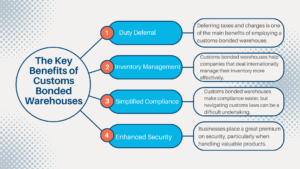Customs Bonded Warehouses are a foundational element of international trade logistics, especially for businesses navigating duty structures, regulatory compliance, and working capital constraints. As global trade volumes increase and supply chains stretch across borders, companies are under growing pressure to balance speed, cost efficiency, and compliance — all at the same time.
While customs bonded warehousing has long helped importers defer duties and manage inventory efficiently, evolving trade models now demand more integrated and scalable solutions. This is where advanced trade infrastructure such as Free Trade Warehousing Zones (FTWZs) begins to play a larger role — building on the advantages of bonded warehousing while addressing its operational limitations.
With a complicated network of rules, taxes, and logistics to manage, international trading can frequently appear overwhelming. Customs bonded warehouses, on the other hand, provide a simplified option for companies wishing to increase their international presence. This blog will examine the ways in which customs-bonded warehouses streamline global trade, lower expenses, and improve operational effectiveness. We’ll also discuss the function of Free Trade Zones (FTZs) in India and stress how crucial they are to international trade.
What Are Customs Bonded Warehouses?
Secure locations where products can be kept without the need to pay customs duties right away are known as customs bonded warehouses. Because customs officials have approved these warehouses, companies are able to postpone paying duties until the products are removed for distribution or sale. Essentially, a bonded warehouse gives businesses flexibility and financial advantages by acting as a short-term storage facility for imported goods.
The Key Benefits of Customs Bonded Warehouses
1. Duty Deferral
Deferring taxes and charges is one of the main benefits of employing a customs-bonded warehouse. Companies are allowed to import products, hold them in a bonded warehouse, and only pay the relevant customs upon the products’ release. Businesses can better manage cash flow and make investments in other areas of their operations thanks to this financial flexibility.
2. Inventory Management
Customs-bonded warehouses help companies that deal internationally manage their inventory more effectively. Faster distribution and lower transportation costs are made possible by businesses storing their products closer to the final consumer. Businesses that need to respond swiftly to changes or demands in the market would especially benefit from this.
3. Simplified Compliance
Customs bonded warehouses make compliance easier, but navigating customs laws can be a difficult undertaking. Strict customs laws govern warehouse operations, guaranteeing that every item kept there is tracked and observed. This expedites the process of bringing products to market and helps companies avoid possible fines for non-compliance.
4. Enhanced Security
Businesses place a great premium on security, particularly when handling valuable products. Strict security requirements are met by customs bonded warehouses, which offer a secure environment for goods kept there. Businesses can rest easy knowing that there is less chance of theft or damage.
5. Flexibility in Distribution
Customs-bonded warehouses give companies more options on how to distribute their goods. Depending on their particular requirements, businesses may decide to keep their products in a bonded warehouse for a short time or for a long time. Businesses may better manage their supply chains and quickly meet market demands because to this flexibility.
How Customs Bonded Warehouses Facilitate International Trade
Now that we’ve outlined the benefits of customs bonded warehouses, let’s explore how they specifically facilitate international trade.
1. Reducing Costs for Importers
Businesses frequently incur large upfront fees in the form of customs tariffs and taxes when importing goods into a nation. By deferring these expenses until the products are prepared for sale or distribution, customs bonded warehouses enable companies to drastically cut down on upfront costs. Small and medium-sized businesses (SMEs), who might not have a lot of money to invest up front, can especially benefit from this.
2. Streamlining Customs Processes
The lengthy and intricate customs clearance procedure frequently results in delays and extra expenses. Businesses can expedite this procedure by using customs bonded warehouses. Customs pre-approves commodities kept in bonded warehouses, facilitating a quicker clearing process upon eventual release. This results in a more effective supply chain and quicker access to goods.
3. Supporting Global Expansion
Customs bonded warehouses offer a useful option for companies wishing to grow globally. They make it easier for businesses to distribute goods rapidly and effectively by allowing them to store goods in key areas close to their target markets. Through faster delivery times, this not only lowers transportation costs but also improves customer satisfaction.
4. Enabling Re-exportation
The capacity to reexport products without paying customs charges is a major benefit of customs bonded warehouses. Businesses can re-export goods without paying local customs taxes if they import them into a bonded warehouse and then elect to sell them in another nation. Businesses now have more chances to investigate other markets without having to worry about paying customs.

The Role of Free Trade Zones (FTZs) in India
Free commerce Zones (FTZs) are essential for boosting foreign investment and commerce in India. FTZs are places set aside specifically for the import, manufacturing, and export of commodities without the typical customs procedures and fees. These areas offer a number of advantages to enterprises, such as:
Duty-Free Imports: Similar to customs bonded warehouses, goods imported into FTZs are exempt from duties until they are sold or distributed.
Simplified Processes: FTZs simplify customs processes, allowing for quicker clearance and reduced paperwork.
Enhanced Investment Opportunities: FTZs attract foreign investment by providing a favorable regulatory environment and tax incentives.
How Customs Bonded Warehouses and FTZs Work Together
To facilitate international trade, FTZs and customs bonded warehouses work in tandem. To increase their operational efficiency, businesses can make use of customs bonded warehouses located within FTZs. For example, an organization can import products into a free trade zone (FTZ), hold them in a customs-bonded warehouse, and postpone taxes while simultaneously taking advantage of the additional incentives provided by the FTZ.
This integrated setup allows businesses to operate within a more structured and predictable trade environment. While the bonded warehouse enables duty deferment and secure storage, the FTZ framework enhances this by offering superior infrastructure, streamlined customs interaction, and policy-backed operational flexibility. Together, they help reduce procedural friction, improve cargo visibility, and support smoother movement of goods across borders.
In practical terms, this means companies can plan imports more strategically, align inventory release with market demand, and optimise working capital — all while remaining fully compliant with customs regulations. The combination of customs bonded warehousing within an FTZ ultimately transforms trade operations from reactive logistics management into a more controlled and efficient supply chain model.
FTWZ: A More Advanced Evolution of Bonded Warehousing
While customs bonded warehouses address critical challenges such as duty deferment, compliance, and secure storage, their scope is often limited to warehousing alone. As trade volumes scale and supply chains become more complex, businesses increasingly require integrated logistics, value-added services, and long-term operational flexibility — areas where traditional bonded warehouses may fall short.
Free Trade Warehousing Zones (FTWZs) build upon the core benefits of customs bonded warehousing while offering a more comprehensive trade solution. FTWZs combine bonded storage with large-format infrastructure, multi-client facilities, seamless customs integration, and value-added activities such as labeling, packaging, kitting, and distribution — all within a single customs-notified zone.
CBW vs FTWZ: A Practical Comparison
Customs bonded warehouses are effective for duty deferment and short- to medium-term storage. However, FTWZs go a step further by offering:
- Larger, scalable warehousing infrastructure
- Integrated logistics and distribution capabilities
- Support for value-added services within the bonded environment
- A single-window, compliance-driven operating framework
OSV FTWZ: Translating Policy into Practical Trade Advantage
While FTWZs offer a powerful framework for modern trade, their real impact depends on how effectively they are planned, managed, and operated. OSV FTWZ has been developed to bridge the gap between policy intent and on-ground execution, offering businesses a compliant, scalable, and operationally efficient FTWZ ecosystem.
OSV FTWZ is designed to support importers, exporters, and global supply chains with:
- Strategically located FTWZ facilities aligned with major ports and consumption hubs
- Customs-compliant bonded infrastructure built for high-volume and long-term storage
- Integrated logistics support enabling seamless inbound, storage, value addition, and outbound movement
- A compliance-driven operating model that reduces risk while improving turnaround times
By combining the core advantages of customs bonded warehousing with the expanded capabilities of an FTWZ, OSV FTWZ enables businesses to move beyond basic duty deferment and toward smarter inventory planning, cash flow optimisation, and resilient supply chain design.
Conclusion
Customs-bonded warehouses are a vital resource for companies that deal internationally. They improve security and inventory management, simplify compliance procedures, and offer substantial financial benefits. Customs-bonded warehouses will continue to be an essential part of supply chain strategies as businesses continue to negotiate the challenges of international trade.
The advantages of customs-bonded warehouses are further enhanced in India by the function of free trade zones, which foster an atmosphere that allows companies to prosper in the global economy. Businesses can streamline their international trade procedures, cut expenses, and eventually succeed more in the global economy by comprehending and utilizing the benefits of customs bonded warehouses and FTZs.


